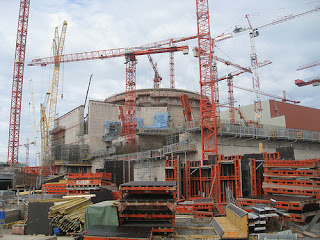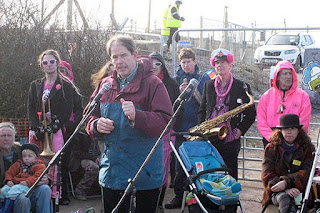I once wrote a novella about nuclear power that satirised the ease with which politicians fell for its sales pitch, seduced by that strong subtext of sexual potency, the Promethean glamour of seeming to commission the ultimate power source.
Except the reality was and remains a lengthy catalogue of dangerous failures, ineptitude, accidents and catastrophes – of which Chernobyl is the most famous.
A recent scientific study shows that "accidents on the scale of the 1979 meltdown at Three Mile Island in the USA (a damage cost of about 10 Billion USD) are more likely than not to occur every 10-20 years".
The same study highlights the "'flawed and woefully incomplete' public data from the nuclear industry" that is "leading to an over-confident attitude to risk".
Once nuclear power was sold to us as electricity supply that would be "too cheap to meter". Now, even though the British Tory government knows it's amongst the most expensive power sources on the planet...
... they're still keen to sell Hinkley C to a British public that doesn't want it [original data here].
They know, too, that the specific technology to be deployed at Hinkley C already has "a lengthy catalogue of dangerous failures, ineptitude, accidents and catastrophes" at the previous attempts to deploy it – Flammanville, Taishan and Olkiluoto – but they still want to commission another one like it.
They know that the nuclear industry was forced to become so secretive that its secrets – usually cover-ups of the lengthy catalogues of dangerous failures, ineptitude, accidents and catastrophes – were kept from governments and the public for years (and who knows what has yet to come to light) – and yet the fact that the Chinese government might have access to the secrets of the British nuclear industry and national grid is only offered as a bogus concern, not a serious obstacle to the much more important aim – remaining in the Chinese and French governments' good books.
If I didn't think that it was unlikely that members of the Tory government have read my novella, I'd think it was a case of life imitating or parodying art. (Although I wouldn't put it past the potential of civil servants to be consciously doing so – twisted, devious creatures capable of not just double-think, but triple-, quadruple-, and even octople-think that they are.)
I have observed the British government's grotesque and contorted dance of death with EDF and Hinkley C since it was begun by Tony Blair, with a mixture of fascination, horror and contempt, of the sort I normally reserve for watching the calculated relapse of an ex-alcoholic drawing themselves into a terminal vortex, the culmination of which is starkly obvious to all powerless onlookers.
When Theresa May hit the pause button on approving the Hinkley C decision when everyone expected her to rubber stamp it, she was like the pantomime villain horsing around with the expectations of the audience, just so that when they finally commit the Terrible Deed, they can reap even more opprobrium from the audience than they would have received had they dealt the blow straight away.
There has been so much coverage in the press that everyone can see what a terrible decision this is. The tail has wagged the dog, but it's the taxpayer who will foot the bill if the thing ever does get built. Here's 5 reasons why it shouldn't be built.
There is still a chance it might not. There is still a chance that May could be playing a double bluff: in her wish not to offend the Chinese she has greenlighted the project even though she knows it is an awful bet (she can't be so blinkered that she doesn't know this, can she?) hoping that some other factor – technical, financial, legal – there are a few in the pipeline – will prevent it ever being built, thereby exonerating her from possible future blame by the Chinese.
There's a chance, but it's a slim one. I wouldn't bet on it if I were a gambler.
The whole thing is a farce, but it's more than that, it's a parody of a farce that is still a farce. A post-post-modern farce. Grotesque, and embittered with the self-hypnotised reflection of irony in love with itself.
Meanwhile, if you have a spare hour, watch the video below which shows how, by the time Hinkley C is built, technological disruptions in the fields of energy storage, electric vehicles, autonomous vehicles, solar power and computing will mean there will be absolutely no market for its over-expensive electricity.
It will be old. Out of date. Unnecessary. But still producing nuclear waste we cannot yet render safe.
David Thorpe is the author of:
- Best Practices and Case Studies for Industrial Energy Efficiency Improvement (with Oung, K. and Fawkes, S. UNEP, 2016)
- A London Conversation: Business Briefing on Green Bonds (The Fifth Estate, 2015)
- The One Planet Life (Introduction: Jane Davidson. Routledge, 2015)
- Earthscan Expert Guide to Energy Management in Buildings (Earthscan, 2013)
- Earthscan Expert Guide to Energy Management in Industry (Earthscan, 2013)
- Earthscan Expert Guide to Solar Technology (Earthscan, 2011)
- Earthscan Expert Guide to Sustainable Home Refurbishment (Earthscan, 2010)









